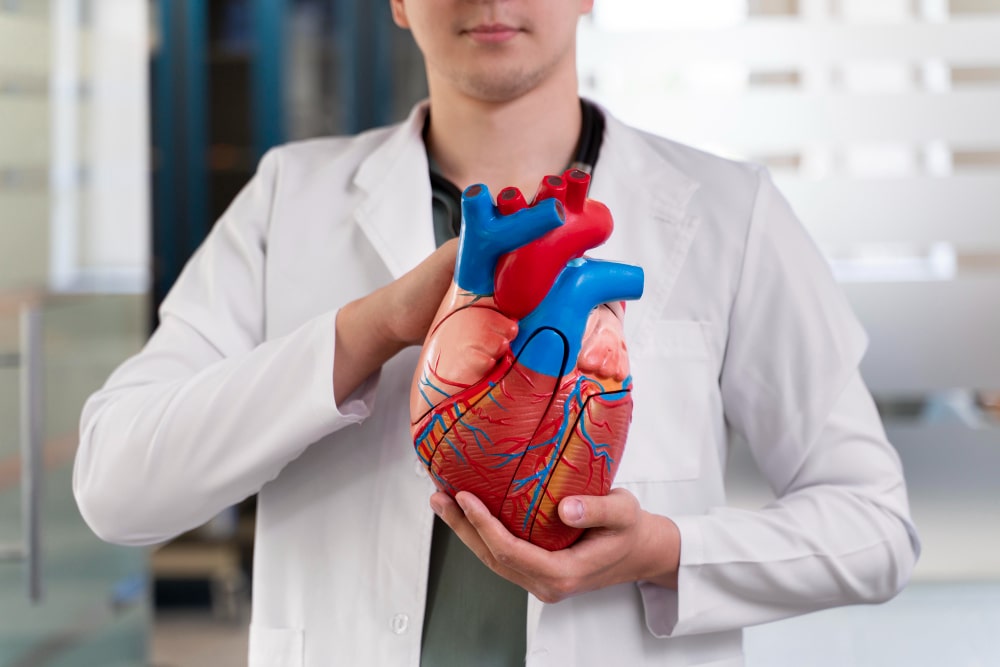Best Cardiologist in Nalgonda
What is Cardiology?
Cardiology is the branch of medicine that focuses on the diagnosis, treatment, and prevention of diseases and disorders of the heart and blood vessels (cardiovascular system). It is a specialized field within internal medicine, and medical professionals who specialize in cardiology are known as cardiologists.

Cardiology encompasses the study of various heart conditions, including coronary artery disease, heart failure, arrhythmias (abnormal heart rhythms), valvular heart diseases, congenital heart defects, and other disorders affecting the heart and blood vessels. Best Cardiologist in Nalgonda are trained to evaluate, diagnose, and manage these conditions using a combination of medical history analysis, physical examination, diagnostic tests, and treatment interventions.
Cardiology involves both non-invasive and invasive procedures. Non-invasive procedures include electrocardiography (ECG or EKG), stress tests, echocardiography (ultrasound of the heart), nuclear imaging, and other imaging techniques to evaluate heart function and structure. Invasive procedures may involve cardiac catheterization, angiography, angioplasty, and cardiac surgery.
The field of cardiology also emphasizes preventive cardiology, which aims to identify and manage risk factors for heart disease before they lead to serious problems. This includes lifestyle modifications such as adopting a healthy diet, regular exercise, smoking cessation, and managing conditions like high blood pressure, high cholesterol, and diabetes.
Advancements in cardiology have led to significant improvements in the diagnosis and treatment of heart diseases, allowing for early detection, intervention, and better patient outcomes. Cardiologists work closely with other healthcare professionals, including cardiovascular surgeons, nurses, and rehabilitation specialists, to provide comprehensive care to patients with cardiovascular conditions.
Overall, cardiology plays a critical role in preserving heart health, managing heart diseases, and enhancing the quality of life for individuals with cardiovascular conditions.
Best Cardiology Treatment in Nalgonda involves the diagnosis, prevention, and management of various heart-related conditions and diseases. The field of cardiology encompasses both medical and surgical interventions, aiming to improve heart health, alleviate symptoms, and reduce the risk of complications. Here are some common cardiology treatments:
- Medications: Cardiologists prescribe medications to manage heart conditions such as hypertension (high blood pressure), coronary artery disease, heart failure, arrhythmias, and others. These medications may include beta-blockers, ACE inhibitors, diuretics, antiplatelet drugs, anticoagulants, and cholesterol-lowering drugs.
- Lifestyle Modifications: Promoting a healthy lifestyle is crucial in managing heart health. Cardiologists often recommend lifestyle changes such as adopting a balanced diet, regular exercise, weight management, smoking cessation, and stress reduction techniques.
- Angioplasty and Stenting: In cases of blocked or narrowed coronary arteries, cardiologists may perform angioplasty, a procedure to widen the artery using a catheter with a balloon at the tip. Additionally, a stent, a small mesh tube, may be inserted to help keep the artery open and improve blood flow.
- Coronary Artery Bypass Grafting (CABG): CABG is a surgical procedure used to treat severe coronary artery disease. During this procedure, a surgeon creates new pathways for blood flow by grafting healthy blood vessels from other parts of the body, bypassing the blocked or narrowed coronary arteries.
- Pacemakers and Implantable Cardioverter-Defibrillators (ICDs): These devices are implanted under the skin and help regulate the heart’s electrical activity. Pacemakers are used to treat slow heart rhythms, while ICDs monitor heart rhythms and deliver electric shocks to restore normal rhythms in cases of life-threatening arrhythmias.
- Cardiac Rehabilitation: This comprehensive program focuses on improving cardiovascular health after a heart attack, heart surgery, or other cardiac events. It includes exercise training, education, counseling, and support to help patients regain strength, manage risk factors, and enhance overall well-being.
- Heart Transplantation: In severe cases of heart failure, where other treatments are not effective, heart transplantation may be considered. This procedure involves replacing a diseased or failing heart with a healthy heart from a donor.

